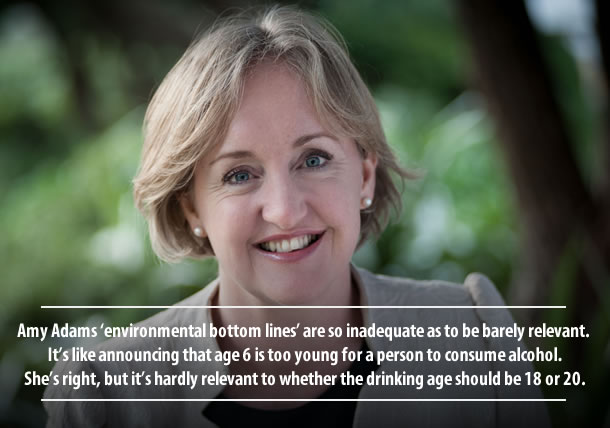The Government’s recently announced approach to fresh water is indeed a step forward and Ministers are to be congratulated for that. But don’t be fooled by Environment Minister Amy Adam’s effusion – we still don’t have a water management policy that will stop New Zealand’s rivers, lakes and estuaries deteriorating further, and we certainly don’t have a policy that will deliver swimmable water.
The policy announced on Thursday provides a set of rules for what regional councils must do when it comes to fresh water (regional councils have the job of approving activity that affects freshwater). The rules define upper limits for water pollutants like nitrates and bacteria like E Coli. Regional councils can’t allow these limits, known as ‘environmental bottom lines’, to be exceeded.
There are two big problems with what the Minister has delivered.
First, her ‘environmental bottom lines’ are so inadequate as to be barely relevant. It’s like announcing that age 6 is too young for a person to consume alcohol. She’s right, but it’s hardly relevant to whether the drinking age should be 18 or 20.
Amy Adams is proud that at least there is now a limit to the tolerance for pollution in our waterways. So what? The limit merely states the extreme we need to avoid. Take E. coli, for example. The upper limit is set so that you won’t get sick boating and wading but you may well if you’re swimming or gathering food – there is a high risk of infection if you try those. There are similar issues with other water quality indicators. The upper limits for each indicator are set to prevent some toxic catastrophe, but at levels well below that the water will still be in poor health and not great at sustaining natural ecosystems, particularly when two or more indicators interact in unpredictable ways. There are also indicators that are relevant to water quality but are not included in the rules (there is a plan to add them, we have to hope it will happen quickly).
Second, buried within the rules are three words that scuttle any guarantee that the policy will prevent any worsening in water quality from here. Government says regional councils must “maintain or improve the overall quality of fresh water…” – so far so good. We know that means no worsening from here in any stretch of water. But it then goes on to qualify this by saying “ …within a region”. That opens up a can of worms – it implies one waterway in a region can be sacrificed (not maintained or improved) as long as there is another one that is improved.
This is a cop out, political spin to deliberately fudge the commitment to environmental bottom lines. Further it’s not needed – as the Minister claims – in order to deliver a workable, community based water management regime. Actually it would be far easier for regional councils and their communities to work out water management strategies if they had greater clarity – i.e. if they knew that no waterway could be sacrificed, that all waterways must be maintained or improved. Now they have the added burden of grappling with the possibility that one river can be traded off against another. Not only does the fudging undermine the commitment to environmental quality, but it thwarts the community management process itself. How are you going to compare the damage done in one river with the improvement done in another and ensure no overall deterioration? Impossible.
The Minister made a big noise about the fact that “more than 60 scientists” were involved in setting the environmental bottom lines. However, scientists can’t tell us what goals to aim for, they can only ever tell us how to achieve our goals. Both of the fudges in these rules are political choices, not questions of science. The Minister chose to keep the toxic three word qualification – “within a region” – which undermines the commitment to the environment and complicates community processes. The Minister decided that safe boating and wading is all we want, rather than swimmable rivers. All the scientists have done is tell her what such an un-inspirational target implies in terms of E Coli levels. The reason behind the fudges is clear – they take the edge off the stark reality that unless we’re willing to accept even more deterioration in our waterways, farming can only continue to intensify if practices are improved.
New Zealanders need to separate the science from the policy, to separate meaningful bottom lines from political spin. That’s the only way the policy can be truly understood and assessed. To that end, earlier in the year we convened a panel of scientists and, like the Minister’s super 60, ours came from public and private sectors, and academia. We have been exploring the panel members’ views on the rules and our aim is to report the results in coming weeks.
Gareth Morgan, Geoff Simmons & Susan Guthrie

